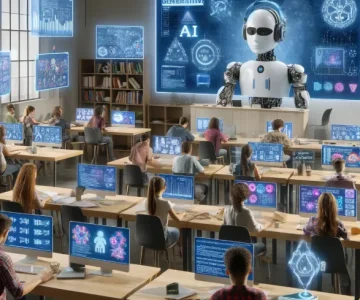In a world where technology evolves faster than ever, Artificial Intelligence (AI) has shifted from being a specialist’s field to a skill everyone can benefit from. AI shapes daily life in ways both visible and hidden—from recommending movies and songs to helping manage global supply chains and assisting in medical diagnoses. As its influence expands, learning about AI is becoming a critical step toward preparing for the challenges and opportunities ahead.
1. Adapting to a Transforming Job Landscape
The workplace is undergoing a rapid shift, with AI automating certain tasks while creating entirely new professions. These emerging roles often require a blend of technical knowledge, creative problem-solving, and human-focused skills like empathy and collaboration.
By understanding how AI works, individuals can see automation not as a threat, but as a tool to improve their performance and expand their capabilities. Those with AI literacy will be better positioned to navigate an evolving economy and to take advantage of roles that didn’t exist a decade ago.
2. Building Stronger Critical Thinking Skills
Working with AI means dealing with patterns, data analysis, and the creation of predictive models. Learning these skills—whether through building simple AI applications, experimenting with machine learning tools, or evaluating algorithmic decisions—trains the mind to approach problems logically and with precision.
This process also develops the ability to question data sources, recognize bias, and weigh the ethical considerations behind technology-driven decisions—skills that are valuable in any profession.
3. Encouraging Innovation and Entrepreneurship
Breakthrough ideas often emerge where technical knowledge meets creative vision. Early exposure to AI concepts such as speech recognition, image analysis, or natural language processing gives learners the foundation to imagine and design impactful solutions.
With AI education, even small start-ups or individual innovators can develop tools and services that make a difference in areas like healthcare, sustainability, and global logistics.
4. Promoting Responsible and Informed Technology Use
AI increasingly influences what we read, the jobs we qualify for, and how resources are distributed. Without understanding how these systems operate, people risk becoming passive consumers of technology.
AI education equips individuals with the knowledge to engage with these systems thoughtfully, focusing on fairness, privacy, and transparency. This awareness ensures they can participate in shaping technology rather than simply accepting its outcomes.
5. Contributing to Solutions for Global Challenges
Many of today’s most urgent issues—climate change, public health, and resource management—require insights from massive datasets. AI can reveal patterns, model potential outcomes, and accelerate research that leads to practical solutions.
Those with AI expertise will be able to contribute directly to efforts such as improving renewable energy efficiency, developing medical treatments, or creating sustainable food systems.
6. Embracing Lifelong Learning
AI isn’t static; it’s a field that changes constantly. Staying relevant means committing to ongoing education, whether through workshops, online courses, or professional training.
This mindset of continuous growth allows people to adapt quickly, stay competitive, and use emerging tools to solve new challenges as they arise.
7. Empowering Educators and Institutions
For AI education to be successful, schools and universities need to integrate it into their programs and ensure teachers have the skills to teach it effectively. Educators who understand AI can design engaging lessons, lead meaningful discussions, and make complex topics approachable.
By supporting teachers and institutions, we build a foundation where students can explore AI with confidence and curiosity, preparing them for both academic and professional success.
Conclusion: Preparing for an AI-Driven Future
AI has become deeply woven into the fabric of society, influencing the way we live, work, and interact. Teaching AI literacy is about more than learning how technology functions—it’s about empowering people to use it wisely, creatively, and ethically.
By investing in AI education, we’re preparing a generation to think critically, act responsibly, and lead with vision in a world where technology will only grow more influential.





